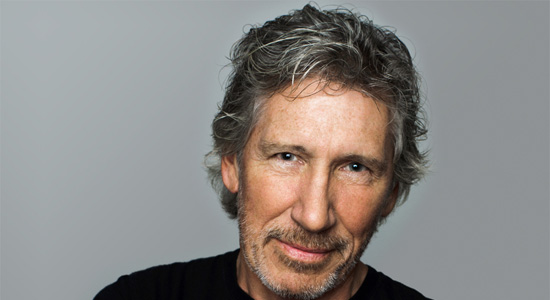
Roger Waters is not a man to shy from aggressive questions focusing on the personal or the geopolitical, especially if you’re discussing The Wall, his 1979 classic (then with Pink Floyd, which handed over this lengthy conceptual work in the band’s legal split) turned into a narrative-laced concert fi lm/Blu-ray in 2015, with its accompanying soundtrack. Instead, every moment of a face-to-face chat held atop Sony’s Manhattan offices found Waters staring straight at his interviewer, save for odd gazes averting to overcast skies while mulling a question. “Roger’s intense, unafraid to make his opinion known,” says Sean Evans, The Wall’s co-director/writer, about fashioning improvisational narrative episodes with Waters, including road trips through Italy and France where his father and grandfather are buried as veterans of the World Wars. These rejoinders give Waters’ Wall epic conceptualization via duality, particularly the politics its creator has doubled down on when facing the Israel/Palestine conflict by urging fellow artists to boycott playing concerts in Israel.
—A.D. Amorosi
Your name is above The Wall’s title. I know you got the rights exclusively in the Pink Floyd split. Why is this more important to you than other conceptual projects you’ve written, from Animals to even The Final Cut and its Falklands War twist? They have their own inner and outer monologues. Why does The Wall merit continued attention?
I guess because The Wall’s metaphor is so damn clever, so neat and so open to all sorts of extrapolation, conceptualism and interpretation. The idea is so simple and so good with conclusions that you can point to, conclusions that are very easy to arrive at. You can answer so many political and personal questions here. I wrote this in 1979, and am certainly more aware now than I was in my 30s. We get older, we get wiser … hopefully.
You made a speech at the United Nations several years back and discussed how we built walls out of fear, then broke them down when fears were conquered. What do you say then to someone such as a Donald Trump whose existence, whose platform is based on building and maintaining new walls?
Trump is interesting. He’s symbolic of the “amusing ourselves to death” society, because in order to be part of it, it is necessary for him to be completely un-self-aware. The Trump that you and I see is an obnoxious clown who upholds everything that I find reprehensible about American society, but also the entertainment industry. See, Donald thinks he’s admirable. He suffers from a syndrome—he may be brilliant, but damaged, but in reality, he appears to have a low IQ. There are people who are dipshits who think they are da Vinci, think they understand the world and how it works; that he has interesting political ideas. In reality, though, he’s a 16th of an-inch deep, this guy.
That’s remarkably dangerous.
Yes, because the rabble can be roused. We saw that in the Weimar Republic. I hate to bring up the Germany of the ’30s, but there are models you can see that are deeply important for us to understand why things happened. People were disaffected The economy was in tatters. So, here that is now—part of the unequal distribution of resources going on in the U.S. where riches are controlled by less than one percent and living standards have gone down for middle and lower classes. It’s no surprise that people are pissed off have no idea where to direct their actions. So, where do they? Communists. Terrorists, fucking Mexicans, whoever. It is very easy to convince people that somebody else is responsible for the trouble; that if you only corralled them, everything would be all right.
The idea that the U.S. is a still a democracy is nonsense.
Everybody knows this, but we all still lip service to the idea that it is. That’s kind of dopey. If you say anything against it, you are a pariah. You can’t criticize the state. I’m starting to get a bit of lashing, suddenly fi nding one or two doors closed to me here and there, especially in the media … It’s funny. The company is trying to insure that I talk about the product. Fuck you, say I. They say I shouldn’t bite the hand that feeds me. If I wasn’t busy biting hands, I wouldn’t have written most of the stuff I did. Have they forgotten “Welcome To The Machine”?
I know you auditioned to be in Alan Parker’s 1982 film. Did you intend to be in this Wall as you are now, reading letters about your father and such?
No, it actually didn’t happen until after we had finished the concert footage. I knew there had to be more; a “what if” where the film started with me driving away from a show and into this journey, a road trip …
Three tours, two films. Do you feel as if you placed a period at the end of the sentence that is The Wall?
I’m probably done, yeah. I do, however, keep quite a few of the props and bits of scenery around in the hopes that—and I have publicly declared this—if the U.S. figures out how to persuade the Israelis to end the occupation of Palestine and tear down that fucking fence, that I will go and do The Wall in Israel as an act of celebration. For both of the peoples, so that we can all join together just like we did when the Berlin Wall came down. I don’t know if it will happen in my lifetime; maybe they’ll have to wheel me on. I keep an open mind and heart to such a peaceful resolution.
I know you identify as an atheist, so this isn’t a phrase you want to hear, but from your mouth to God’s ear.






